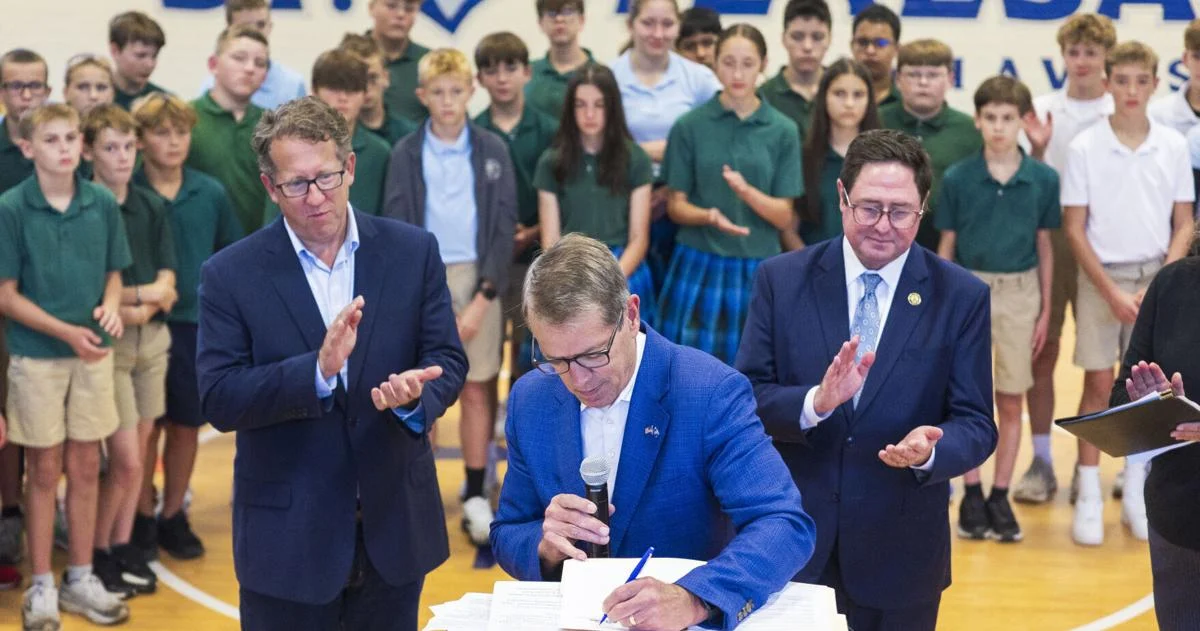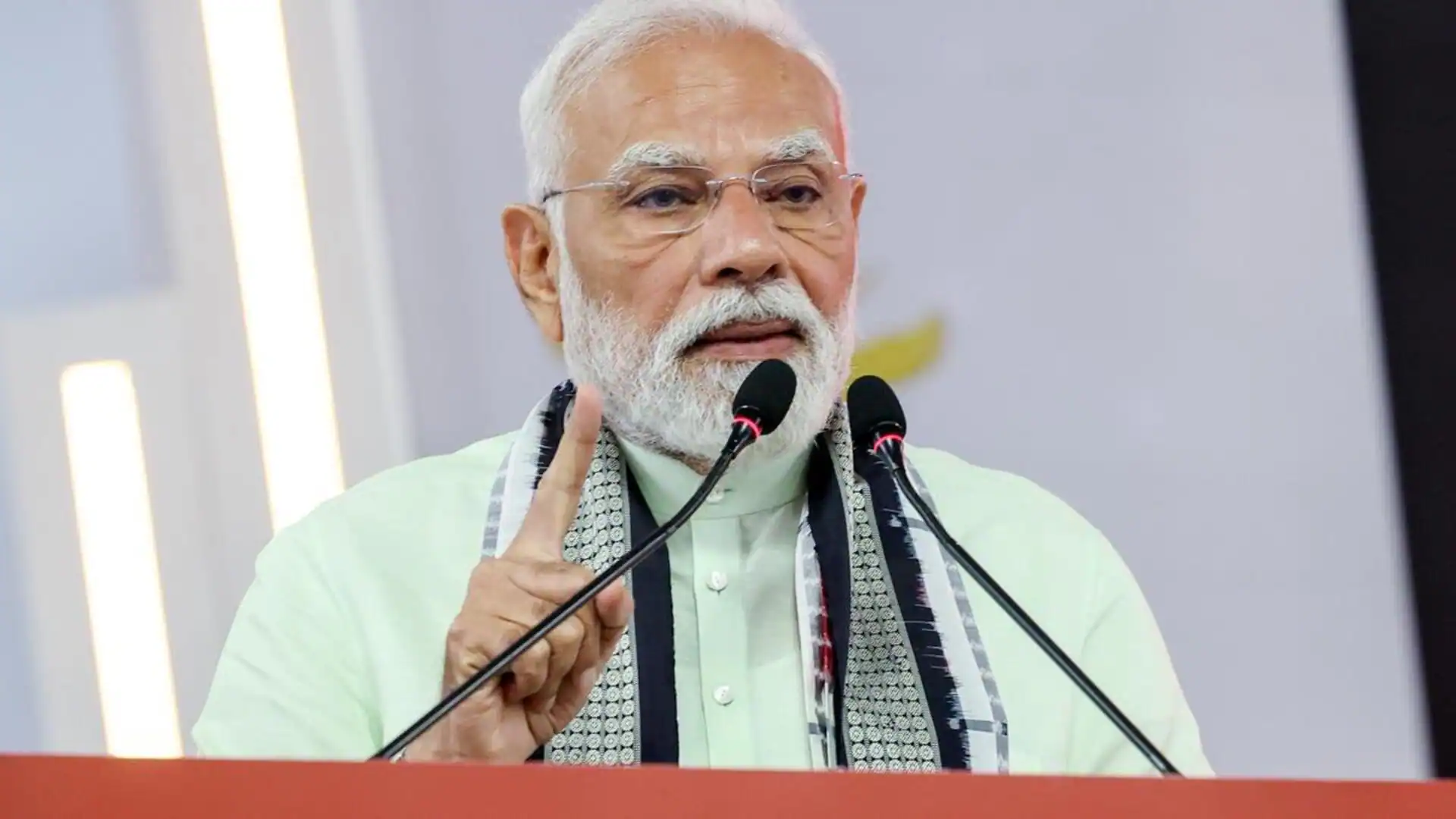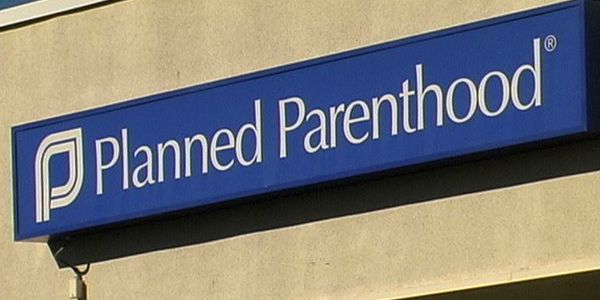
Nebraska will participate in a federal dollar-for-dollar scholarship tax program intended to help families pay for private school, Gov. Jim Pillen announced Monday, calling the program a “game-changer” for Nebraska families.
Pillen, alongside Reps. Adrian Smith and Mike Flood and dozens of Lincoln Catholic school students, announced Monday the state will opt into a federal school choice program that will allow families to earn “extraordinary” and “transformative” tax credits for their donations.
“Let me just make it really clear, I am not opting this in, I am cannonballing it in,” Pillen said as he stood surrounded by students at St. Teresa Catholic School.
“This is gigantic for education,” he added.
Pillen, Smith and Flood announced Nebraska’s participation in the program at the Lincoln K-8 private school at 616 S. 36th St., during an all-school assembly Monday afternoon. To welcome the state officials to their school, students sang patriotic tunes like “God Bless America,” “You’re a Grand Old Flag” and the national anthem.
The first-of-its-kind school scholarship tax program was approved as part of President Donald Trump’s so-called “One Big Beautiful Bill” on July 4, which received support from Nebraska’s entire congressional delegation. The law is set to take effect Jan. 1, 2027.
Under the measure, people who make charitable donations to so-called Scholarship Granting Organizations, which are typically for private schools, will now be eligible to earn a dollar-for-dollar tax credit of up to $1,700 for their contributions.
The scholarship organizations would then be able to disburse the donations in the form of scholarships for students to use on expenses such as tuition, learning materials, services for students with disabilities and school supplies, including school uniforms.
Smith, who helped champion the scholarship tax credit program in Congress, said he introduced the Educational Choice for Children Act, which ultimately became the current scholarship tax program, to benefit families, students and educators from across America.
“We want to empower families across America with the best decisions to be made in the interest of their children as it relates to education,” he said. “The beauty of the school choice provision is that a scholarship-granting organization formed at the local level will hopefully get the resources to wrap their arms around students’ needs, families’ needs.”
Nebraska joins two other states to opt in so far, including Tennessee and North Carolina, both led by Republicans. Democratic governors in New Mexico, Wisconsin and Oregon have announced they do not intend to participate, according to Education Week.
State attempts have failed
The announcement comes after advocates for private school scholarships in Nebraska have faced multiple roadblocks in their frequent attempts to pass similar programs locally over recent years.
In 2023, the Legislature approved the Opportunity Scholarships Act, which set aside $10 million in state funds for private school vouchers.
Public school advocates later launched a successful petition drive to put the fate of the measure in the hands of voters, collecting more than 117,000 signatures across the state.
But before Nebraskans could vote on whether to retain the law in November 2024, lawmakers approved a measure that essentially replaced the 2023 tax credit program to instead set aside $10 million of state funding for private school vouchers.
The Nebraska State Education Association, the state’s teachers union, was then forced to embark on a second petition drive to repeal the new law, which again proved successful. After collecting more than 87,000 signatures, over 57% of Nebraska voters elected to repeal the scholarship law last November.
Between the two Nebraska measures, about 8,000 scholarships totaling $17.4 million were awarded to students across the state before the programs were repealed.
In the proclamation signed by Pillen on Monday opting the state in, the governor claimed the teachers’ union “stole these opportunities for students in poverty to receive educational opportunities.”
Tim Royers, president of the NSEA, which represents more than 23,000 teachers and public school employees across the state, said the decision to opt into the program goes against what a majority of Nebraskans voted for.
“Today’s decision by Gov. Pillen undermines the clear will of Nebraska voters, who just rejected state-level vouchers at the ballot box,” Royers said in a statement. “This federal program is a backdoor voucher scheme that diverts public resources into private systems, without accountability or limits.”
Listen now and subscribe: Apple Podcasts | Google Podcasts | Spotify | RSS Feed | SoundStack | All Of Our Podcasts
When asked about the ballot results from last November and whether opting into the federal program goes against the state’s wishes, Pillen said he didn’t believe the majority of Nebraskans are opposed to school choice, despite residents overwhelmingly voting in opposition to similar programs.
“No, Nebraskans totally, totally agree,” Pillen said.
Not limited to low-income families
Unlike Nebraska’s past attempts at implementing a similar law, the federal program is not limited to low-income families. Instead, those who earn at or below three times an area’s median household income will qualify for the program.
In Lincoln, the median household income falls just below $70,000 a year, according to 2023 census data, meaning families who make a combined $210,000 a year in the Capitol City would still be eligible for the tax credits.
The federal program was cut back from its original form by the U.S. Senate before final approval in July, which put a lower cap on the tax credits and inserted an opt-in requirement for states.
Previous drafts of the bill allowed donors to receive a match of up to $5,000 or 10% of their income and required all states to participate in the program.
The federal program is “worse” than the bill repealed by Nebraskans in 2024, Royers said.
“In no way, shape or form are we ever going to support a program that lets families making nearly a quarter of a million dollars get a tax credit-funded voucher,” he told the Journal Star.
In July, when the law was passed, state officials, like Sen. Pete Ricketts and Tom Venzor, the executive director of the Nebraska Catholic Conference, touted the program as a success, while also saying they wished the program allowed for a higher tax credit, calling it “a great starting point.”
On Monday, Pillen said he hopes to pursue more school choice bills in Nebraska in the future to further solidify the program in the Cornhusker State.
“If I have the privilege to serve a second term, it’s a high priority for me to get major school choice legislation passed in the state of Nebraska,” he said.
Opportunity Scholarships of Nebraska, a scholarship-granting organization formed to implement the state tax credit program, applauded the decision, claiming the program will benefit students and families across the state.
“This scholarship program will give hope to countless kids across the state of Nebraska, and (Opportunity Scholarships of Nebraska) stands ready to help serve and guide parents to access the best education for their children,” Rick Bettger and Kim Schroll, board co-chairs, said in a joint statement.
John Gage, the state director of Americans for Prosperity-Nebraska, also praised Pillen’s decision to participate in the program.
“Nebraska is grateful to have both a governor and a president who know that families, not school systems, are best equipped to make decisions about their children’s education,” he said in a statement. “Every student deserves the opportunity to learn in a school environment that best meets their needs.”
Rebecca Firestone, the executive director of OpenSky Policy Institute, a Nebraska-based left-leaning think tank, said there are better avenues that can be used to support the state’s children, including maintaining and expanding food security programs, increasing health care access and providing a high-quality public education starting at birth.
“Nebraskans care about our young people, but wiser, research-backed options to provide for a brighter future certainly exist that would better serve our state,” Firestone said in a statement.
Firestone also said the bill allows states to establish guardrails “with no required transparency, quality control or accountability measures.”
“This creates a wide runway for waste, fraud and abuse,” Firestone said.
Royers said the governor’s announcement aligns the state with a federal initiative that “undermines the public schools that serve the vast majority of our state’s students.”
“It marks a troubling departure from the values that have long defined Nebraska’s commitment to equitable, high-quality public education,” he said.
Reach Jenna Ebbers at 402-473-2657 or jebbers@journalstar.com.
Love
0
Funny
0
Wow
0
Sad
0
Angry
0
Be the first to know
Get local news delivered to your inbox!
* I understand and agree that registration on or use of this site constitutes agreement to its user agreement and privacy policy.
Jenna Ebbers
K-12 education reporter
Get email notifications on {{subject}} daily!
Your notification has been saved.
There was a problem saving your notification.
{{description}}
Email notifications are only sent once a day, and only if there are new matching items.
Followed notifications
Please log in to use this feature
Log In
Don’t have an account? Sign Up Today



